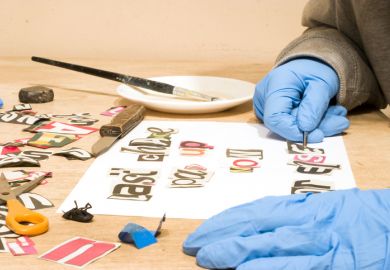The types of assessment that students are least likely to ask an essay mill to complete for them are those that are least likely to be set by lecturers, according to an Australian study that questions whether simply relying less on essays in grading would be sufficient to combat contract cheating.
Drawing on surveys of more than 14,000 students and in excess of 1,100 academics at eight Australian universities, researchers found that students felt that classmates were likeliest to pay someone to complete an assignment for them when it had a short deadline or a heavy weighting in the overall grade. About one in three students who said that they had used essay mills – and about one in four who had not – perceived that cheating would probably occur on a range of assignments frequently used by lecturers: for example, those that require research, analysis and thinking, those that have no right answer, and “real world” tasks.
There were four assessment methods that students considered to be less susceptible to contract cheating, although none was regarded as being immune – with about 15 to 20 per cent of students who themselves had cheated, and about one in 10 of those who had not, perceiving misconduct as being likely.
However, these assessments – in-class tasks, personalised and unique assignments, vivas, and reflections on placements – were among the methods least likely to be used by the academics who took part in the study. Only between a quarter and a third of lecturers said that they set these with at least moderate frequency.
The researchers, led by Tracey Bretag and Rowena Harper of the University of South Australia, found that academics were more likely to use the teaching methods that were perceived as being harder to outsource if they believed that their institution supported efforts to combat contract cheating.
Writing in Assessment & Evaluation in Higher Education, the researchers say that by making more use of these assessment methods, “it may…be possible to make contract cheating less likely”.
Thomas Lancaster, senior teaching fellow in computing at Imperial College London and an expert in contract cheating, said that the study demonstrated how academics needed to be actively involved in the assessment process to stamp out contract cheating, but noted that “the downside of these [methods] is they can be very demanding of staff to do well”.
“I’ve long been recommending using vivas as a method to check that students produced major pieces of work for themselves, but they do need to be properly resourced and fairly structured,” Dr Lancaster said.
The findings come amid growing concern about the use of essay mills – a previous paper based on the same dataset found that 6 per cent of students confessed to some form of contract cheating.
One solution advocated by some academics is to rely less on essays and more on exams. The authors of the Australian study argue that there is a “growing body of evidence, however, that examinations provide universities and accrediting bodies with a false sense of security”, citing survey data showing that students “reported engaging in undetected cheating in invigilated examinations at higher rates than any other type of cheating, including contract cheating in written assessments”.
Dr Lancaster, a critic of heavy reliance on essays in grading, said that the best option was “a variety of different assessment types”, including presentations, group work and exams, plus “vivas and other checkpoints of authenticity” for “high-stakes components”.
POSTSCRIPT:
Print headline: Lecturers failing to combat essay mills owing to assessment design
Register to continue
Why register?
- Registration is free and only takes a moment
- Once registered, you can read 3 articles a month
- Sign up for our newsletter
Subscribe
Or subscribe for unlimited access to:
- Unlimited access to news, views, insights & reviews
- Digital editions
- Digital access to THE’s university and college rankings analysis
Already registered or a current subscriber?








